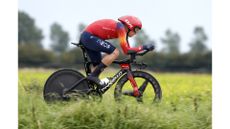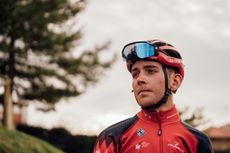Former Sky rider Michael Barry 'questioned the use of Tramadol' with team's management
Canadian former pro Michael Barry says that he expressed concerns about the use of powerful pain killers and sleeping pills at Team Sky - Barry says he knows nothing about the contents of package delivered to Critérium du Dauphiné


Former Team Sky rider Michael Barry has spoken about the use of medications at the British-registered WorldTour team in the light of recent revelations relating to therapeutic use exemption certificates and the movement of a 'mystery package' to France.
The 41-year-old Canadian rode with Team Sky from 2010 to 2012, before leaving the team after admitting to doping during his time at Lance Armstrong's US Postal squad between 2002 and 2006. Barry said he stopped doping when he left Postal in 2006.
Barry has previously spoken out about the use of powerful painkiller Tramadol at Sky and generally in pro cycling, but has expanded further on his experience with medications on the team during a new interview with the Telegraph, published on Sunday.
"I loved my time with the team, I had a great experience there" said Barry. "But, ethically, I really started questioning the use of the Tramadol, and the sleeping pills, especially when you see the younger riders using this stuff heavily. If we went into a medical clinic and just asked their GP, they probably wouldn’t give these out. And that is not ethical."
>>> British Cycling coach at centre of Team Sky mystery package scandal to be quizzed by MPs
Barry says that he talked with the team regarding his concerns about the use of Tramadol and other strong medications that are an ethical 'grey area'.
After recounting an alleged exchange with one of Sky's doctors where he questions Tramadol use, Barry says that he suggested that records should be kept of medications being used, and by whom.
Get The Leadout Newsletter
The latest race content, interviews, features, reviews and expert buying guides, direct to your inbox!
"I suggested that the team should maintain an inventory of the drugs given out at each race and pass it along to the doctor at the next race. To my knowledge, that was never done."
During the Telegraph interview, Barry says that he is surprised that Sky transported Fluimucil medication from the UK to Bradley Wiggins at the Critérium du Dauphiné – and underlined that he did not have any knowledge of that specific incident.
"They should have been clearer about it, so I’m not surprised by the scrutiny. But the team is big. There is a lot of stuff going on, and I wasn’t at the race," said Barry.
Barry announced his retirement from pro cycling in September 2012, after giving evidence to a US Anti-Doping investigation into the use of performance-enhancing drugs at US Postal. He was suspended for six months.
Team Sky issued a statement in April 2014 saying that the team has never administered Tramadol to riders for training or racing.
“None of our riders should ride whilst using Tramadol — that’s the policy of this team,” said Sky in its 2014 statement. “Team Sky do not give it to riders whilst racing or training, either as a pre-emptive measure or to manage existing pain.
“We believe that its side effects, such as dizziness and drowsiness, could cause issues for the safety of all riders. We also feel that if a rider has the level of severe pain for its appropriate use they should not be riding.”
The UK Anti-Doping Agency is currently preparing a report as a result of its investigation into Team Sky, British Cycling, the use of TUEs and the medication transported via jiffy bag in 2011.

Thank you for reading 20 articles this month* Join now for unlimited access
Enjoy your first month for just £1 / $1 / €1
*Read 5 free articles per month without a subscription

Join now for unlimited access
Try first month for just £1 / $1 / €1

Nigel Wynn worked as associate editor on CyclingWeekly.com, he worked almost single-handedly on the Cycling Weekly website in its early days. His passion for cycling, his writing and his creativity, as well as his hard work and dedication, were the original driving force behind the website’s success. Without him, CyclingWeekly.com would certainly not exist on the size and scale that it enjoys today. Nigel sadly passed away, following a brave battle with a cancer-related illness, in 2018. He was a highly valued colleague, and more importantly, an exceptional person to work with - his presence is sorely missed.
-
 Ride the nostalgia trip as Panasonic returns to European cycling after 40 years
Ride the nostalgia trip as Panasonic returns to European cycling after 40 yearsThe electronics branded super-team graced the jerseys and the top of the results lists throughout the Eighties
By James Shrubsall Published
-
 What happened to the 'golden age' for cycling in the UK?
What happened to the 'golden age' for cycling in the UK?The pandemic was an opportunity for cycling to take off in our country, but new figures show that it has stagnated in England
By Adam Becket Published
-
 Overachiever: Cameron Wurf competed in the Amstel Gold, La Flèche Wallonne and an Ironman, all in just eight days
Overachiever: Cameron Wurf competed in the Amstel Gold, La Flèche Wallonne and an Ironman, all in just eight daysCameron Wurf is both a member of Team Ineos Grenadiers and an accomplished professional long course triathlete who has racked up numerous World Tour and Ironman race finishes across his career.
By Kristin Jenny Published
-
 ‘I feel lucky to be alive’: Magnus Sheffield speaks for the first time about Gino Mäder’s fatal crash
‘I feel lucky to be alive’: Magnus Sheffield speaks for the first time about Gino Mäder’s fatal crashThe American describes what he saw at the Tour de Suisse, eight months after the tragedy
By Tom Davidson Published
-
 Tom Pidcock: Tour of Britain route 'not really ideal for me'
Tom Pidcock: Tour of Britain route 'not really ideal for me'Brit says he wants to win home stage race, even if the course plays in Wout van Aert's favour
By Tom Davidson Published
-
 This 39-year-old INEOS Grenadiers rider moonlights as a pro triathlete
This 39-year-old INEOS Grenadiers rider moonlights as a pro triathleteA Jack of all trades, Cameron Wurf is a domestique for INEOS Grenadiers professional cycling team, but doubles as a successful pro triathlete.
By Kristin Jenny Published
-
 Ineos Grenadiers' only female rider Pauline Ferrand-Prévot eyes road return
Ineos Grenadiers' only female rider Pauline Ferrand-Prévot eyes road returnMountain bike legend could be back in the peloton next year
By Tom Davidson Published
-
 Egan Bernal has nose operation to help 'air passage' ahead of 2023
Egan Bernal has nose operation to help 'air passage' ahead of 2023Procedure not thought to be connected to the life-threatening crash which affected Colombian last year
By Adam Becket Published
-
 Tweets of the week: Ineos Grenadiers' three wise men, team jersey déjà vu and World Cup celebrations by bike
Tweets of the week: Ineos Grenadiers' three wise men, team jersey déjà vu and World Cup celebrations by bikeHere's our social media round-up, featuring a cycling all-star nativity
By Tom Davidson Published
-
 Ineos Grenadiers sign their first female rider
Ineos Grenadiers sign their first female riderPauline Ferrand-Prévot reported to be joining new Ineos mountain bike team, alongside Tom Pidcock
By Adam Becket Last updated